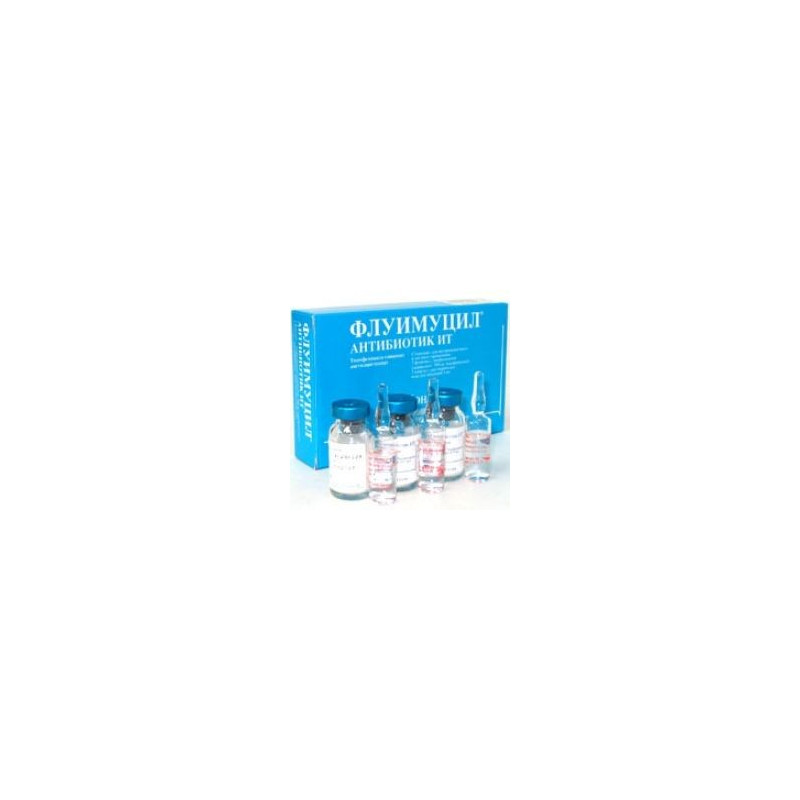



 All payments are encrypted via SSL
All payments are encrypted via SSL
 Full Refund if you haven't received your order
Full Refund if you haven't received your order
Fluimucil IT is used to treat infectious and inflammatory diseases of the respiratory tract caused by microorganisms sensitive to the drug and accompanied by mucostasis.
Tiamphenicol glycinate acetylcysteinate is rapidly distributed in the body, accumulates in the tissues of the respiratory tract in high therapeutic concentrations. The maximum plasma concentration is reached within 1 hour after intramuscular administration. The half-life is about 3 hours, the volume of distribution is 40-68 liters.
Plasma protein binding up to 20%.
Excreted by the kidneys by glomerular filtration, 24 hours after the administration, the amount of unchanged thiamphenicol in the urine is 50-70% of the injected dose.
It penetrates the placental barrier.
Acetylcysteine after administration is rapidly distributed in the body, the half-life is 2 hours. In the liver it is deacitulated to cysteine. In the blood, there is a moving equilibrium of free and plasma-bound acetylcysteine and its metabolites (cysteine, cystine, diacetylcysteine).
Acetylcysteine penetrates the intercellular space. Mostly distributed in the liver, kidneys, lungs, bronchial secretions.
It is excreted by the kidneys as inactive metabolites (inorganic sulphates, diethylcysteine), a small part is excreted unchanged through the intestines. It penetrates the placental barrier.
Thiamphenicol glycinate acetylcysteinate is a complex compound that combines the antibiotic thiamiphenicol and the mucolytic acetylcysteine.
Tiamphenicol has a broad spectrum of antibacterial action, is active in vitro against bacteria that most often cause respiratory tract infections.
Acetylcysteine, breaking the disulfide bonds of mucoproteins, quickly and effectively loosens sputum, pus, reduces their vyzkost and promotes discharge.
Acetylcysteine facilitates the penetration of the antibiotic thiamphenicol into the lung tissue, inhibits the adhesion of bacteria to the epithelium of the respiratory tract.
In pregnancy, the drug is prescribed only when the potential benefit to the mother outweighs the potential risk to the fetus.
If necessary, the appointment of the drug during lactation should stop breastfeeding at the time of treatment.
With intramuscular administration, a slight burning sensation is possible at the site of administration. Rarely reticulocytopenia, anemia, leukopenia, neutropenia, thrombocytopenia.
Inhalation - reflex cough, local irritation of the respiratory tract, stomatitis, rhinitis, nausea.
In patients with bronchial asthma, bronchospasm is possible - in this case, bronchodilators are prescribed.
The simultaneous appointment of antitussive drugs can increase the stagnation of sputum due to the suppression of the cough reflex.
It is not recommended to mix with other drugs in an aerosol.
Fluimucil ® -antibiotic IT is administered intramuscularly, used for inhalation, applications, washing cavities.
Through a bronchoscope, endotracheal tube, tracheostomy - 1-2 ml of solution.
For the introduction of the paranasal sinuses, as well as for washing the cavities after surgical interventions in the area of the nose and mastoid process, 1-2 ml of solution.
For diseases of the nasopharynx and ear, dig in 2-4 drops in each nasal passage or external auditory canal.
If necessary, the dose can be increased by 2 times (in the first 2-3 days of treatment in severe cases). Do not increase the dose in premature babies and newborns, as well as in patients over 65 years of age.
The course of treatment is not more than 10 days.
Carefully.
In children of the first two years of life due to the age-related features of the kidney function is used with caution.
Carefully.
During treatment, a picture of peripheral blood should be monitored.By reducing the number of leukocytes (less than 4 thousand / μl) and granulocytes (more than 40%), the drug is canceled.
Fluimucil Solution ® - antibiotic IT does not affect the ability to drive vehicles and other mechanisms.
